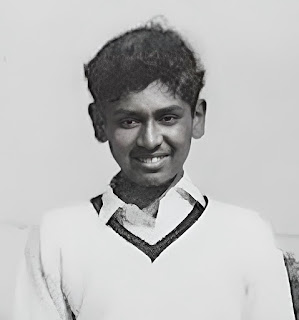CHARNEY HALL Old Boys 7
Born in 1936, the son of the joint headmaster and co-owner of Charney Hall, he is recorded in the School Lists of Charney Hall between the Summer term of 1944 until the Autumn of 1948. Thereafter he attended Rugby School from 1949 to 1954 and began his national service at 18 (still compulsory at that time) in Egypt and Cyprus from 1954 to 1956. From 1956 to 1963 he studied at Oxford University, like his father before him, and then at the American University of Beirut.
David Hirst appears to have drifted into journalism by chance as he describes in the excerpt
of an interview with Robin Yasmin-Kassab quoted below.
Issandr el Amrani makes reference to David as follows :
“In his memoir, Dining with al Qaeda, Hugh Pope - another veteran foreign correspondent in the region - says Hirst was one of the correspondents he respected most, particularly after witnessing a scene in which Hirst, ‘a slight and utterly unphysical man, evaded his would-be kidnappers in the vital first few minutes by kicking and shouting as they tried to force him from the street into a basement’."
The National News states :
‘Hirst is one of the most respected journalists of his generation, recognised among his peers as a tireless chronicler of Middle Eastern affairs and a measured voice within the field's frequently changing arguments.’
In an interview with Robin Yassin-Kassab David Hirst gives a hint of his beginnings as a journalist:
The Electronic Intifada contributor, Robin Yassin-Kassab, interviewed Hirst on his work and views.
Robin Yassin-Kassab : ‘You did your national service in Cyprus and Egypt just before the 1956 Suez War. What effect did your first experience of the Middle East have on you? Why did you end up spending your life in the Middle East, particularly in its more violent corners? Have kidnappings and bannings discouraged you?’
David Hirst : ‘Yes, I was one of the last generation of British 18-year-olds obliged to do two years of military service. Politically speaking, it had virtually no effect on me; I was an immature youth from a thoroughly apolitical middle class background, and knew next to nothing about international affairs, and hardly knew, for example, the difference between Arabs and Israelis. But — unusually for a mere private soldier — I sought and secured permission to use a fortnight’s leave to travel round Syria, Iraq, Jordan and Lebanon. I enjoyed the experience. After three years at Oxford, I could not think of a career to embark on. Remembering the American University of Beirut, I wrote and asked them if there were any kind of introductory course about the Middle East that I could follow there. There was. With a vague idea of staying there for a couple of years or so, I found myself drifting into journalism, and, taking to it, I ended up staying fifty.
I grew deeply interested in the politics of the region; I also like to think that — having come to the area entirely devoid of preconceptions, or anything more than the most rudimentary knowledge, tabula rasa as it were — the opinions and interpretations I developed about the Arab-Israeli conflict were always as near as possible spontaneously personal and first-hand ones; I quickly learned that, as such, they were all too apt to clash with what one might call the prevailing Western orthodoxy of the time. I stayed because I felt personally at home in the region, because my work was so professionally interesting, and my newspaper — unusually — never asked me to go anywhere else.
As for the dangers, I definitely didn’t relish them, but unless they had become overwhelming and personal — i.e, for example, if I knew, as I did for a while, that there was a plan to kidnap me — I would never have left the region because of them.’
David was once banned from visiting 6 Arab countries….
His main body of work relating to the Middle East was written several years ago. He was Middle East correspondent for the Guardian between 1963 to 1997 but now at the age of 88 yrs. he still continues his researches into this volatile region of the world to this day. One article in Watan, in which he questions the potential collapse of Israel, was published as recently as 23 December 2023. Another ‘Is Israel going the way of the Crusaders?’ appeared in the Middle East Eye on 3 June 2024.
He has written 4 books which have received critical acclaim by his peers :
Oil and Public Opinion in the Middle East (1966)
The Gun and the Olive Branch : The Roots of Violence in the Middle East (1977)
Sadat (with Irene Beeson) (1981)
Beware of Small States : Lebanon, Battleground of the Middle East (2010)*
*Translated into Arabic in 2013
David Hirst has been remarkably perceptive in his writings….
‘More than a decade before Israel's New Historians revolutionized the study of Israeli history, David wrote The Gun and the Olive Branch, a classic, myth-breaking general history of the Israeli-Palestinian conflict’.
In 2024 we have been made well aware that the conflict has not yet ended - there is a lot of anger out there - and the prospect of peace is transient. David’s efforts, his search for the truth over the years, without prejudice, sometimes controversial, have provided an authoritive record enabling those in power, who are able, indeed if willing, to make a difference, to appreciate both sides of the story.
For us mere mortals. we are given a chance to gain some understanding of the history and the ‘whys and wherefores’ of the region and dream that one day there will be a lasting peace.
A selection of references for David Hirst :
https://en.wikipedia.org/wiki/David_Hirst_(journalist)
https://www.latimes.com/archives/la-xpm-1986-09-27-mn-10384-story.html - 1986 Kidnap
Is Israel going the way of the Crusaders? | Middle East Eye








Comments